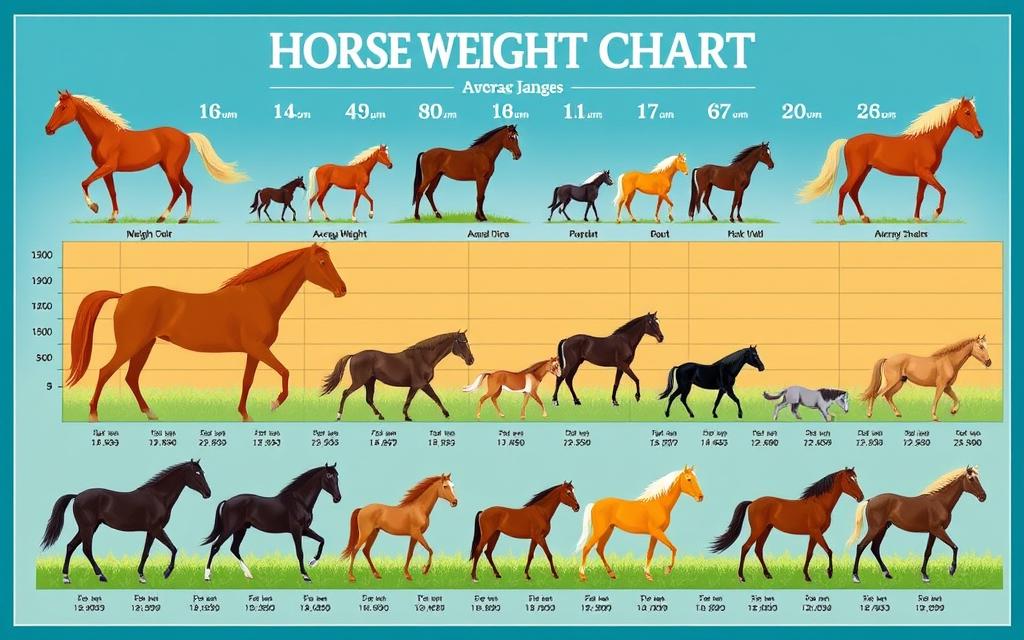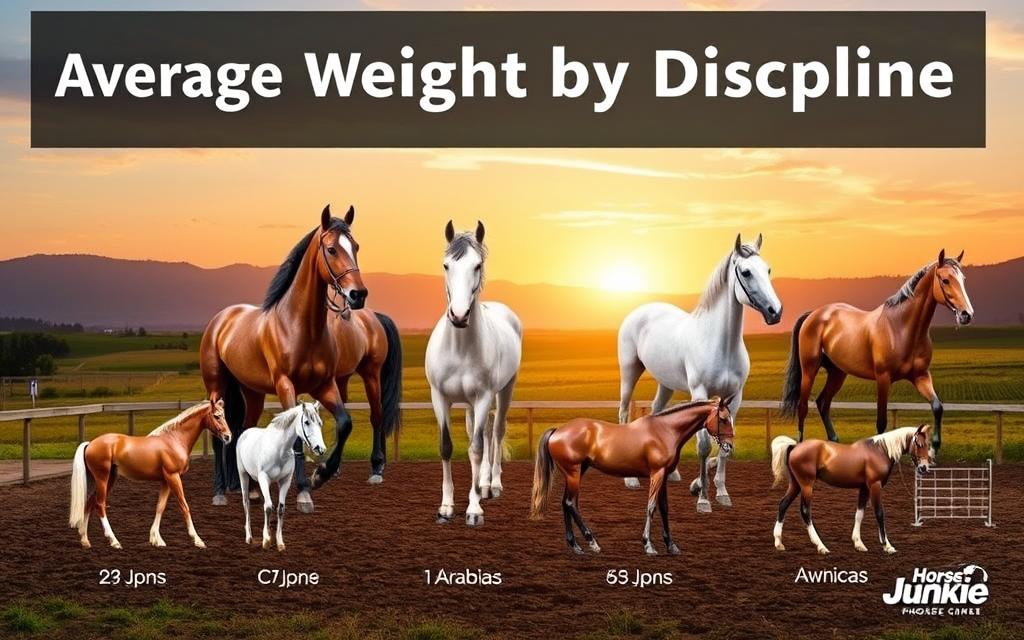Average Weight of a Horse: Key Facts Unveiled

Did you know knowing a horse’s average weight can change how we care for them? Horses can weigh between 900 to 2,200 pounds, depending on their breed and size. Understanding factors like bone structure, muscle mass, and age is key to their care. In this article, we’ll explore how different elements affect a horse’s weight and health.
Key Takeaways
- Horses typically weigh between 900 and 2,200 pounds.
- Weight varies significantly based on breed and age.
- Regular monitoring of a horse’s weight is vital for health.
- Obesity in horses can lead to serious health complications.
- Understanding unique weight-related health concerns per breed is crucial.
- Consulting a veterinarian can help tailor weight management plans.
Understanding Horse Weight Basics
Figuring out the average weight of a horse involves looking at several factors. These factors include breed, diet, and age. Each of these can change how much a horse weighs. This is why different breeds have different weight ranges.
What Determines a Horse’s Weight?
Many things can affect a horse’s weight:
- Breed: Some breeds, like Thoroughbreds, average around 1,000 pounds. Draft horses, on the other hand, can weigh much more.
- Diet: A balanced diet is key for a horse’s health. They need to eat about 2.5% of their body weight daily.
- Health Status: A horse’s overall health affects its weight. Regular vet visits are important for monitoring weight and diet.
Breeds and Their Average Weights
Horse breeds vary a lot in weight. For example:
- Thoroughbreds usually weigh between 1,000 to 1,200 pounds.
- Clydesdales are heavier, with weights ranging from 1,540 to 2,200 pounds.
- Ponies, like the Shetland, are much lighter, averaging around 400 pounds.
The Role of Age in Weight Variation
Age is crucial in the weight variation of horses. Foals are born at about 10% of their mother’s weight. They grow fast, reaching about 90% of their adult height by age two. Young horses often weigh less than older ones because they are still growing.
Common Horse Breeds and Their Weight Ranges
Knowing the weight ranges of different horse breeds is key for horse lovers and owners. Each breed has unique traits that affect their average body weight. A horse weight chart helps us see how these traits show up in weight differences.
Thoroughbred Weight Characteristics
Thoroughbreds are known for their speed and agility, weighing between 1,000 to 1,200 pounds. They are athletic and lean, perfect for racing and sports. Their weight is balanced with agility, showing their design for performance.
Arabian Horses: A Lightweight Champion
Arabian horses are known for being light, weighing around 800 to 1,000 pounds. They are versatile and excel in many equestrian areas. Their build and endurance make them a top choice for riders.
Draft Horses: Heavyweights of the Equine World
Draft horses like the Belgian or Percheron are heavy, weighing from 1,600 to 2,200 pounds. They are strong and used for heavy work and farm tasks. Their large body mass is essential for doing tough jobs well.

Factors Affecting a Horse’s Weight
It’s important to know what affects a horse’s weight. Things like what they eat, how much they move, and their health play big roles. These factors help determine if a horse gains or loses weight.
Nutrition and Feeding Practices
A good diet is key for a horse to stay at the right weight. They need:
- Rich forage like hay or pasture
- Concentrated feeds that match their energy needs
- Vitamins and minerals for health
How much and what a horse eats should change based on their work and health. Watching their diet helps keep them healthy.
Exercise and Activity Levels
Exercise is very important for a horse’s weight. Horses that are active tend to manage their weight better. Consider the following in their exercise:
- How hard and long they work out
- How old and fit they are
- The type of activities they do, like riding
Keeping horses active helps their muscles and keeps their weight stable.
Health Conditions Impacting Weight
Some health issues can really affect a horse’s weight. Problems like laminitis or metabolic disorders need careful watching. Regular vet visits are key to catch any weight-related issues early. Managing these conditions helps keep a horse at the right weight for their breed.

The Importance of Weight Management in Horses
Managing a horse’s weight is key to their health and performance. We need to watch their weight closely to spot health problems early. Since the average horse weight varies by breed and individual, it’s important to track these numbers. This helps us find the right weight management strategies.
Why Monitoring Weight Matters
Checking a horse’s weight regularly helps us understand their health better. It lets us catch problems early and improve their health. Factors that can affect a horse’s weight include:
- Poor diet and nutrition
- Exercise levels
- Medical conditions, such as Cushing’s disease

Signs of Underweight or Overweight Horses
It’s crucial to know the signs of weight issues in horses. Underweight horses might:
- Show visible ribs and spine
- Be very tired and lack energy
- Suffer from gastric ulcers or anemia
On the other hand, overweight horses may:
- Have trouble breathing or strain their heart
- Experience joint pain and laminitis
- Not be able to exercise as well
Using fat scoring systems like the Carroll and Huntington (0-5) or Henneke (1-9) helps us check a horse’s condition. We should weigh them every two weeks. This way, we can quickly see any weight changes and adjust their care.
Average Weight of Horses by Discipline
Knowing the average weight of horses by discipline shows us the variety in the equine world. Each equestrian activity has its own weight expectations. These expectations help us understand the ideal weights for peak performance in different settings.
Weight Expectations for Racing Horses
Racing horses usually weigh around 1,000 pounds. Their training focuses on staying fit and lean. This is key for speed on the track. They are bred for speed and have less body weight to improve race performance.
Weight Classes for Show Horses
Show horses must fit into specific weight classes. Light horses weigh between 900 to 1,400 pounds. Heavy breeds, like draft horses, are much heavier. Weight classes help judges compare horses fairly, giving an edge to those who fit the criteria.
Weight Considerations for Working Horses
Working horses need different weights based on their job. Draft horses, like Clydesdales, weigh between 1,800 to 2,200 pounds. They are strong and used for hard tasks. Knowing these weights helps owners manage their horse’s weight for their specific job.

How to Accurately Weigh a Horse
Weighing our horses accurately is key for their health. There are many ways to do this, each with its own benefits and challenges. Knowing these methods helps us keep our horses at a healthy weight, as recommended by horse weight statistics.
Methods for Weighing Your Horse
Using scales made for livestock is the most precise way to weigh a horse. These scales give us exact numbers. It’s important to weigh the horse at the same time every day and after the same meal.
If scales are hard to find, a weight tape is a good backup. These tapes measure a horse’s girth to estimate its weight. However, they might not be as accurate for smaller horses, young ones, or larger breeds.
Using Weight Tapes Effectively
Weight tapes are handy for tracking a horse’s weight. It’s a good idea to take measurements once a month. If you notice big changes, check more often, like weekly or daily.
To figure out a horse’s weight with a tape, use this formula: Heart Girth x Heart Girth x Body Length / 300. For growing horses, you might need a different formula. Always talk to a vet before changing your horse’s diet based on these measurements.

Monitoring and Maintaining Healthy Weight
Keeping a horse at a healthy weight is key. It involves a structured plan and guidance from a vet. Regular weight checks help avoid problems like laminitis, linked to too much weight. A diet that matches the horse’s activity level is vital for their health.
Establishing a Weight Management Plan
Creating a weight management plan starts with regular checks. We use body condition scores (BCS) to track weight changes. The Henneke scale helps us see if a horse is at a healthy weight, aiming for a score of about 5.
For horses needing to gain weight, we aim to add around 50 pounds over a few months. This helps reach a healthy weight score.
- Start with quality forage, like alfalfa-grass mixed hay, as the main diet.
- Choose concentrates based on the horse’s needs, like growth or performance.
- Use accurate feeding by weighing portions, not scoops.
Role of Veterinary Guidance
Getting help from a vet is crucial for a horse’s diet and exercise. Vets help tailor plans for each horse, especially for those with health issues. Conditions like Equine Metabolic Syndrome (EMS) make weight management harder, so vet advice is key.

Good dental care and deworming programs also help with weight management. By actively managing our horses’ weight, we improve their performance and life quality.
The Link Between Weight and Longevity
Understanding how a horse’s weight affects its life is key for good care. The right weight improves performance and lowers health risks. It helps us keep our horses healthy and happy.
Healthy Weight for Optimal Performance
Studies show that a healthy weight boosts a horse’s athletic ability. Horses at the right weight run faster and jump higher. Too much weight slows them down and hurts their performance.
Heart rate and breathing rate show that overweight horses work harder. They need more effort to do the same things as lighter horses.
Weight and the Risk of Injuries
Being too heavy can lead to injuries, especially in the muscles and bones. Obesity in horses is linked to problems like laminitis. It can also hurt their joints and lead to arthritis.
This makes it crucial to watch a horse’s weight closely. We need to manage it well to keep them safe and sound.
Recognizing Weight Changes: When to Act
It’s crucial to watch for weight changes in our horses to keep them healthy. Spotting sudden weight loss or understanding weight gain patterns helps us act fast. This ensures our horses stay well.
Identifying Sudden Weight Loss
Sudden weight loss is a big worry and might mean our horse has a health issue. We should check body condition scores, which tell us if our horse is too thin. Scores of 1-3 mean they’re underweight, possibly due to bad nutrition or health problems.
Using weight tapes for regular measurements helps us catch these changes early.
Understanding Weight Gain Patterns
On the other hand, weight gain can tell us a lot about our horse’s health. If their body condition score is 7 or higher, they might be overweight. This is common in certain breeds like ponies and draft horses.
Knowing why they’re gaining weight, like eating too much or not moving enough, helps us fix the problem. We can change their diet and get them moving more. Talking to vets or horse nutritionists helps us manage their weight better.

Weight Trends Across the Years
Looking at horse weight trends over time, we see many factors at play. The historical averages of horse weight give us key insights. They show how breeding practices have changed, affecting weight gain in different breeds.
Historical Averages of Horse Weight
The average weight of horses has changed a lot over time. This change reflects shifts in breeding goals. For example, riding horses and draft breeds have different weight profiles due to their specific roles.
Foals start at about 10% of their adult weight at birth. They grow fast in the first year, reaching impressive weights by adulthood. Knowing these historical averages helps us understand horse care and weight gain.
Changes in Breeding Practices
Breeding practices have changed, affecting horse physical traits. Selective breeding has focused on traits like speed or strength. This has led to changes in average weights over generations.
These changes show a focus on desired traits and better health. Reflecting on these practices, we see trends in horse characteristics. These trends are linked to breeding decisions that aim for weight gain and fitness.
Conclusion: Key Takeaways on Horse Weight
Knowing a horse’s average weight is key for their care. We’ve looked at how breed, age, and health affect a horse’s weight. Most horses weigh between 900 and 1,200 pounds.
We also saw how different breeds, like Arabians and Draft horses, can be heavier. We talked about the importance of nutrition, exercise, and monitoring for their health.
Reflecting on Our Understanding
Understanding weight management is crucial for our horses’ health and life span. We learned to use Body Condition Scoring to check their weight. Each horse is different, so their care must match their needs.
Future Considerations for Horse Owners
Future horse owners should stay updated on equine health research. We need to keep our horses at a healthy weight for better performance and life quality. By focusing on good nutrition and exercise, we show compassion and care for our horses.
FAQ
What is the average weight of a horse?
How can I determine my horse’s weight?
What factors influence a horse’s weight?
How does breed affect average horse weight?
Why is weight management important for horses?
What should I do if my horse is underweight or overweight?
How does age affect a horse’s weight?
Are there weight expectations for different equestrian disciplines?
What nutritional practices help maintain a healthy horse weight?
How often should I weigh my horse?
Source Links
- HOW MUCH DOES A HORSE WEIGH? Explained in Detail – Horse World
- Horse Weight Factors and Importance | American Horse Trails
- How much weight can a horse comfortably carry?
- Horse Height & Weight: A Guide
- How much does a horse weigh? (Fun facts, calculator, FAQs)
- Maintain Horse Weight | Easy Keeper Horse | Lucerne Farms
- How much does a horse weigh?
- How Much Does a Horse Weigh? With Breed Chart | PangoVet
- How Much Does a Horse Weigh? — The Equine Institute
- How Much Does a Horse Weigh?
- Weight: is your horse the right weight? – World Horse Welfare
- The Importance of Weighing Horse Feed
- A Comprehensive Guide on How Much Does A Horse Weigh
- Estimating actual and ideal bodyweight of adult horses
- How to Weigh Your Horse
- Estimating body weight for horses
- Horse Weight: Horse Body Condition Score | The British Horse Society
- When Horses Need Help Maintaining Weight | Farnam
- Monitoring Your Horse’s Condition
- Impacts of Adiposity on Exercise Performance in Horses
- Increased body fat content in horses alters metabolic and physiological exercise response, decreases performance, and increases locomotion asymmetry
- Equine Body Condition: From Too Fat to Too Thin to Just Right
- How To Tell If A Horse Is Overweight? A Guide
- Weight: is your horse the right weight? – World Horse Welfare
- Growth and Bone Development in the Horse: When Is a Horse Skeletally Mature?
- A:-3.PDF
- Horse body mass
- How Much Does a Horse Weigh? Find Out Now!!!
- How Much Does a Horse Weigh | How Much Does a Average Horse Weigh






